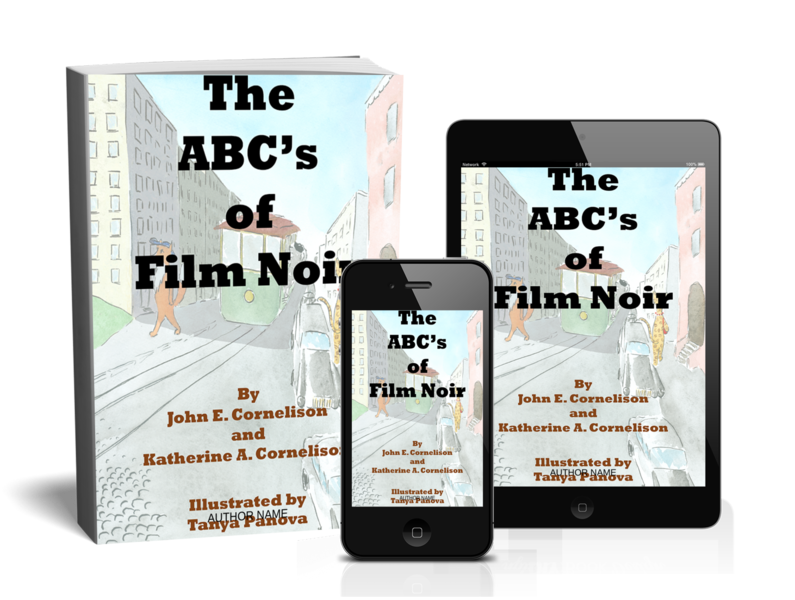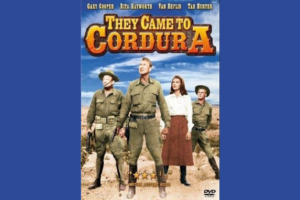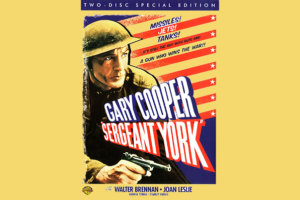Gary Cooper was born in Montana in 1901. Both his parents were English immigrants. The family was well to do and owned a large ranch where Cooper spent a good portion of his youth. Cooper spent a couple of years going to school in England before returning to Montana.
Cooper was out of school for some time with a hip injury from an auto accident. In 1920, he finally graduated with the help of a teacher that got him interested in drama. Cooper went to college in Iowa but was more successful with painting than drama. He left after about 18 months.
In 1924, he followed his parents to Los Angeles where he eventually got a job as a western stunt rider for a poverty row studio. Cooper didn’t care for the stunt work because it was hard on the body and cruel to the horses. He hired an agent and paid for his own screen test.
He began to get extra work like being a Roman guard in Ben-Hur (1925). These slowly increased until he signed with Samuel Goldwyn in 1926. His first big film was The Winning of Barbara Worth (1926) with Ronald Colman and Vilma Bánky. Cooper signed a five-year deal with Paramount. His relationship with Clara Bow lead to roles in Children of Divorce (1927) and Wings (1927). Wings (1927) was the first picture to win the best picture, Oscar. He also started making westerns.
Beginning in 1928, Cooper was paired with a succession of leading ladies trying to find the right chemistry. These actresses included Fay Wray, Evelyn Brent, Florence Vidor, and Esther Ralston. In 1928, he was in Lilac Time (1928) with Colleen Moore which was his first picture with synchronized music and sound effects.
Cooper became a major star with the release of The Virginian (1929). Based on the success of this film, he was cast in a number of westerns and war films. Cooper’s next big hit was as a legionnaire in. Morocco (1930) with Marlene Dietrich. Cooper allegedly picked the director up by his collar during an argument.
After several more films, Cooper left Hollywood for an extended European vacation and rest. He returned in 1932 ready to act and ready to negotiate better contracts. After finishing Devil and the Deep (1932) with Tallulah Bankhead, Cooper jumped into one of his important films, A Farewell to Arms (1932) with Helen Hayes.
Cooper made a lot of movies during this time and many were very good. Fighting his way along in The Lives of a Bengal Lancer (1935), to every man in Mr. Deeds Goes to Town, for which he was Oscar-nominated, taming the west as Wild Bill Hickok in the Plainsman (1936), and exploring China in The Adventures of Marco Polo (1938).
Following some so-so movies, Cooper went on to star in Director William A. Wellman’s adventure Beau Geste (1939). The next year he returned to westerns with The Westerner (1940) fighting against Judge Roy Bean and his corrupt law west of the Pecos. This was followed by Director Cecil B. DeMille’s North West Mounted Police (1940).
Cooper found the everyman again with Meet John Doe (1941). Cooper made two more films that were released in 1941 and directed Howard Hawks. The first was Sergeant York (1941), a movie based on the most decorated soldier of World War I and a movie I always enjoy watching. Cooper earned his first Oscar for Sergeant York (1941). The second movie was Ball of Fire (1941), a comedy with Barbara Stanwyck. The next year Cooper scored another hit with The Pride of the Yankees (1942) followed the next year with For Whom the Bell Tolls (1943).
Cooper helped with the war effort and continued to make movies. Some of the best are You’re in the Navy Now (1951) a wartime comedy, Distant Drums (1951) directed by Raoul Walsh, High Noon (1952) for which he won another Oscar, Springfield Rifle (1952), The Court-Martial of Billy Mitchell (1955), about a military commander between World War I and II working for aviation, Friendly Persuasion (1956), where he played a Quaker that was being affected by the war, and They Came to Cordura (1959), with Rita Hayworth, where Cooper played a coward who was forced to face what makes a man a coward or a hero.
Cooper was a founding member of the Motion Picture Alliance for the Preservation of American Ideals, a conservative organization dedicated, according to its statement of principles, to preserving the “American way of life” and opposing communism and fascism. Other members included Walt Disney, Clark Gable, Ronald Reagan, Barbara Stanwyck, and John Wayne—pressured the United States Congress to investigate communist influence in the motion picture industry. In 1947, Cooper appeared before the House Un-American Activities Committee (HUAC) and was asked if he had observed any “communistic influence” in Hollywood. He did not, however, name names.
Cooper died in 1961, at the very early age of 60.
Selected Movies of Gary Cooper
1942 Academy Award Best Actor Sergeant York (1941)
1953 Academy Award Best Actor High Noon Won
1961 Academy Award Academy Honorary Award — Won
Gary Cooper Films
The Winning of Barbara Worth (1926)
Children of Divorce (1927)
Arizona Bound (1927)
Wings (1927)
Nevada (1927)
The Last Outlaw (1927)
Beau Sabreur (1928)
The Legion of the Condemned (1928)
Doomsday (1928)
Half a Bride (1928)
Lilac Time (1928)
The First Kiss (1928)
The Shopworn Angel (1928)
Wolf Song (1929)
Betrayal (1929)
The Virginian (1929)
Only the Brave (1930)
The Texan (1930)
Seven Days’ Leave (1930)
A Man from Wyoming (1930)
The Spoilers (1930)
Morocco (1930)
Fighting Caravans (1931)
City Streets (1931)
I Take This Woman (1931)
His Woman (1931)
Devil and the Deep (1932)
If I Had a Million (1932)
A Farewell to Arms (1932)
Today We Live (1933)
One Sunday Afternoon (1933)
Design for Living (1933)
Alice in Wonderland (1933)
Operator 13 (1934)
Now and Forever (1934)
The Lives of a Bengal Lancer (1935)
The Wedding Night (1935)
Peter Ibbetson (1935)
Desire (1936)
Mr. Deeds Goes to Town (1936)
The General Died at Dawn (1936)
The Plainsman (1936)
Souls at Sea (1937)
The Adventures of Marco Polo (1938)
Bluebeard’s Eighth Wife (1938)
The Cowboy and the Lady (1938)
Beau Geste (1939)
The Real Glory (1939)
The Westerner (1940)
North West Mounted Police (1940)
Meet John Doe (1941)
Sergeant York (1941)
Ball of Fire (1941)
The Pride of the Yankees (1942)
For Whom the Bell Tolls (1943)
The Story of Dr. Wassell (1944)
Casanova Brown (1944)
Along Came Jones (1945)
Saratoga Trunk (1945)
Cloak and Dagger (1946)
Unconquered (1947)
Good Sam (1948)
The Fountainhead (1949)
Task Force (1949)
Bright Leaf (1950)
Dallas (1950)
You’re in the Navy Now (1951)
It’s a Big Country (1951)
Distant Drums (1951)
High Noon (1952)
Springfield Rifle (1952)
Return to Paradise (1953)
Blowing Wild (1953)
Garden of Evil (1954)
Vera Cruz (1954)
The Court-Martial of Billy Mitchell (1955)
Friendly Persuasion (1956)
Love in the Afternoon (1957)
Ten North Frederick (1958)
Man of the West (1958)
The Hanging Tree (1959)
They Came to Cordura (1959)
The Wreck of the Mary Deare (1959)
The Naked Edge (1961)









Leave a Reply
Your email is safe with us.